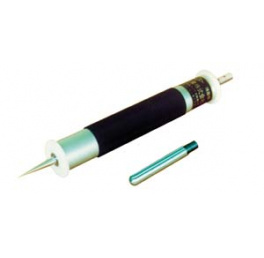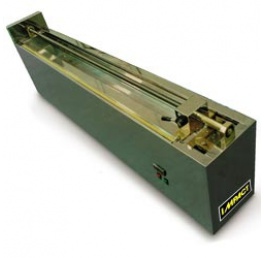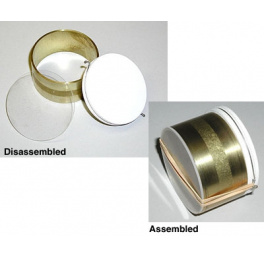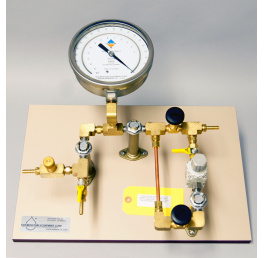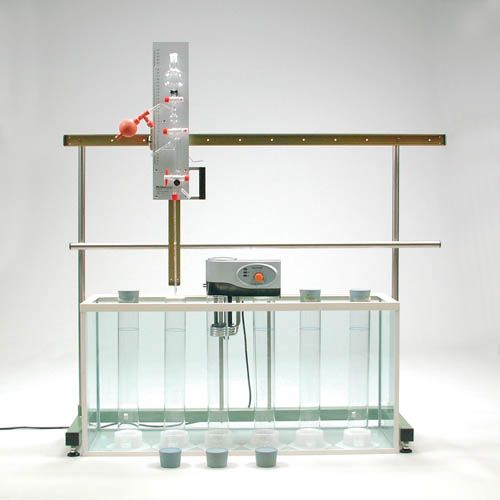
The particle-size distribution is one of the most important physical qualities of soil. The division of soils (soil classification) is primarily based on particle-size distribution. When accurately determining the particle size in samples, in addition to the determination using sieves, other methods will need to be applied.
A simple method for the determination of the particle size is the pipette method. After carbonates, organic substances and possible iron oxide have been removed (because of their binding function) the pipette method is used to determine the fractions of particles smaller than 38 μm.
The method is based on the difference in sedimentation speed between small and large soil particles. The sedimentation of the particles is the result of two opposing forces: gravity and friction resulting from movement in a fluid medium.
In the pipette method, a sample is pipetted at different times and different depths of the suspension of the sample in a measuring cylinder. Time and depth are determined by applying the Law of Stokes. The pipetted suspension is condensed and dried and weighing determines the mass ratio of the pipetted fraction.
Eijkelkamp Soil & Water, in cooperation with research institutes, developed two models of pipette apparatus that meet the standards.
08.16.SA Pipette apparatus, table model in accordance with NEN 5753
Using the basic set the fractions of 7 samples can be determined simultaneously. The pipetting apparatus can be placed on a laboratory table. Among other items the standard set consists of: a runner with pipette holder, a table frame, a glass tank, a heating element with thermostat and stirrer, pipette upper section and pipette lower section, pipette balloon, glass sample cylinders, rubber stoppers and sodium hexametaphosphate.
Eijkelkamp 08.16.SA Pipette Apparatus used to determine the fractions of particles smaller than 38 μm.
- Based on the difference in sedimentation speed between small and large soil particles.
- The sedimentation of the particles is the result of two opposing forces: gravity and friction resulting from movement in a fluid medium.
- A sample is pipetted at different times and different depths of the suspension of the sample in a measuring cylinder. Time and depth are determined by applying the Law of Stokes.
- The pipetted suspension is condensed and dried and weighing determines the mass ratio of the pipetted fraction.
- Available in two models.
- Pipette apparatus, table model in accordance with NEN 5753 (SA) consists of a runner with pipette holder, a table frame, a glass tank, a heating element with thermostat and stirrer, pipette upper section and pipette lower section, pipette balloon, glass sample cylinders, rubber stoppers and sodium hexametaphosphate.
- Pipette apparatus, wall model in accordance with NEN 5753 (SB) consists of a runner with pipette holder, a wall frame, a glass tank, a heating element with thermostat and stirrer, pipette upper section and pipette lower section, pipette balloon, glass sample cylinders, rubber stoppers and sodium hexametaphosphate.
Benefits Pipette apparatus
- Determination of fines acc. to ISO 11277
- Two types: Choose the wall-mounted model (SB) for numerous samples in different tanks
- Choose SA for max 7 samples at a time
- Thermostatically controlled bath temperature
- Modernized to suit all professional users
| Maximum number of samples | 7 |
| Measuring range | < 38 microns |
| Power supply | line voltage |
| Reading accuracy | depending on weighing equipment |
| Sample specification | disturbed |
| Voltage | 230 volt |
| Weight | 75 kg |
| Applications | Geotechnical soil research, Soil physical laboratory research, Erosion research |




